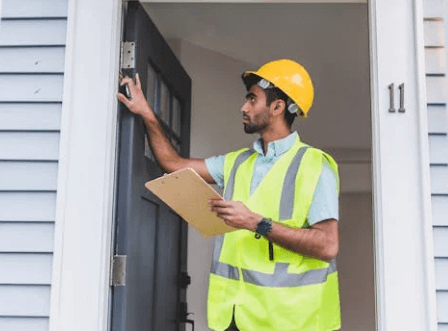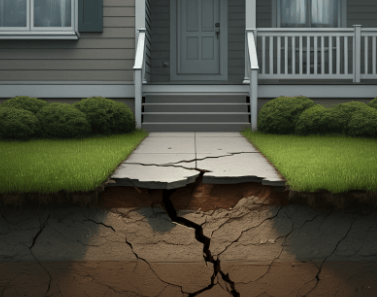Venturing into homeownership is an exciting milestone, yet it’s fraught with decisions that require careful consideration. One such pivotal decision is buying a house with cracked foundation, especially in a state like Florida where environmental factors can exacerbate existing issues. In this blog, we will delve into the intricacies and risks associated with buying a house with cracked foundation in Florida, offering insights and guidance to potential buyers facing this dilemma. Understanding the specific challenges and possible future problems can empower you with the knowledge needed to make an informed decision in your real estate ventures.
Steve Daria and Joleigh, seasoned real estate investors, caution against overlooking the long-term implications of purchasing homes with foundational issues in Florida. They emphasize that environmental elements, such as the state’s notorious hurricane season and high moisture levels, can significantly worsen pre-existing cracks. Their expertise suggests that such investments require a thorough inspection and, potentially, an extensive financial commitment to repairs.
Introduction to Buying a House with Cracked Foundation
When purchasing real estate, the foundation of a home is as critical as its location.
A solid foundation ensures the longevity and safety of the structure, while a cracked foundation can be a source of endless stress and financial strain.
Buying a house with cracked foundation, especially in Florida, requires careful consideration and due diligence.
Here, we’ll explore why a cracked foundation can be a significant concern, how to assess the risks, and what steps to take if you decide to proceed with such a purchase.
Understanding Foundation Cracks
Indeed, not all are equal in severity or significance when it comes to foundation cracks.
The appearance of a crack doesn’t necessarily indicate catastrophic structural damage, but understanding the nuances is crucial for informed decision-making, especially when considering buying a house with a cracked foundation in Florida.
Some cracks may indicate underlying structural issues that require immediate attention.
These cracks are typically broader and more profound and may exhibit signs of movement, such as horizontal displacement or vertical separation.

Additionally, inspectors will evaluate other indicators of foundation problems, such as sticking doors or windows, uneven floors, or gaps around door frames. Based on their findings, inspectors can provide valuable insights into the severity of the foundation issues and recommend appropriate repairs or remediation measures.
Here’s a breakdown of the different types of cracks and what they could mean for a potential homebuyer:
Hairline Cracks
Typically found in newly constructed homes or those that have settled over time.
These are often superficial and may not require immediate repair.
Horizontal Cracks
These can indicate serious structural problems, often caused by hydrostatic pressure from the surrounding soil.
In Florida’s wet climate, these are particularly concerning.
Vertical and Diagonal Cracks
They usually show the foundation settling or shifting soil beneath the home.
They can vary in severity and may necessitate professional evaluation.
Stair-Step Cracks
Cracks are common in homes built on clay soil, which is prevalent in some regions of Florida.
These cracks can signal significant foundation movement and require immediate attention.
Get An Offer Today, Sell In A Matter Of Days
Strategies for Buying a Home with Foundation Issues
If you’re considering buying a house with a cracked foundation, here are some strategies to help mitigate risks:
Assessing the Risks
Assessing the risks involved before buying a house with cracked foundation is essential.
This assessment should consider the cracks’ type, severity, and potential repair costs.
In Florida, factors such as soil type, proximity to water bodies, and climate conditions play significant roles in determining the risk level.
Hire a Professional Inspector
Engaging a qualified inspector who specializes in foundation issues is crucial.
They can provide a detailed assessment of the foundation’s condition and recommend necessary repairs.

Obtain Multiple Repair Estimates
Before finalizing the purchase, get several quotes from reputable foundation repair companies.
This will give you a clearer picture of the potential costs involved.
Negotiate Repair Costs
Use the information from the inspection and repair estimates to negotiate the purchase price or request that the seller make repairs before closing.
Consider Long-Term Costs
Factor in the long-term costs of maintaining a home with foundation issues, including potential insurance and resale challenges.
FAQs About Buying a House with Cracked Foundation
In this section, we’ll address frequently asked questions about the risks and considerations involved in purchasing a home in Florida with a cracked foundation.
Is it always a bad idea to buy a house with foundation problems?
Not necessarily. A home with foundation issues can still be a good investment with a thorough inspection and proper remediation.
However, it’s essential to understand the extent of the repairs needed and the associated costs.
Can foundation repairs permanently fix the problem?
Many foundation repairs can effectively address the underlying issues, especially if done by experienced professionals.
However, ongoing maintenance may sometimes be required to manage the problem.
How do foundation issues affect home insurance and resale value in Florida?
Foundation problems can increase insurance premiums and make it harder to obtain coverage.
They can also impact the home’s resale value, as potential buyers may be wary of the associated risks and costs.
Are there financial assistance programs for fixing foundation issues?
Some government programs and insurance policies may offer assistance for foundation repairs.
Additionally, foundation repair companies often provide financing options to help homeowners manage the costs.
Conclusion
Buying a house with cracked foundation in Florida presents unique challenges and risks. However, with the right approach and due diligence, you can make an intellectual decision that aligns with your financial and lifestyle goals. Remember to prioritize professional inspections, understand the different types of foundation cracks, and consider the long-term implications of your investment. With thorough planning and expert advice, you can easily navigate the complexities of buying a home with foundation issues.
Whether you’re a first-time homebuyer, a seasoned real estate investor, or a home improvement enthusiast, understanding the risks and rewards of buying a house with a cracked foundation is crucial. Following the strategies outlined in this article and asking for professional guidance, you can make a well-informed decision that secures your investment and peace of mind.
**NOTICE: Please note that the content presented in this post is intended solely for informational and educational purposes. It should not be construed as legal or financial advice or relied upon as a replacement for consultation with a qualified attorney or CPA. For specific guidance on legal or financial matters, readers are encouraged to seek professional assistance from an attorney, CPA, or other appropriate professional regarding the subject matter.

